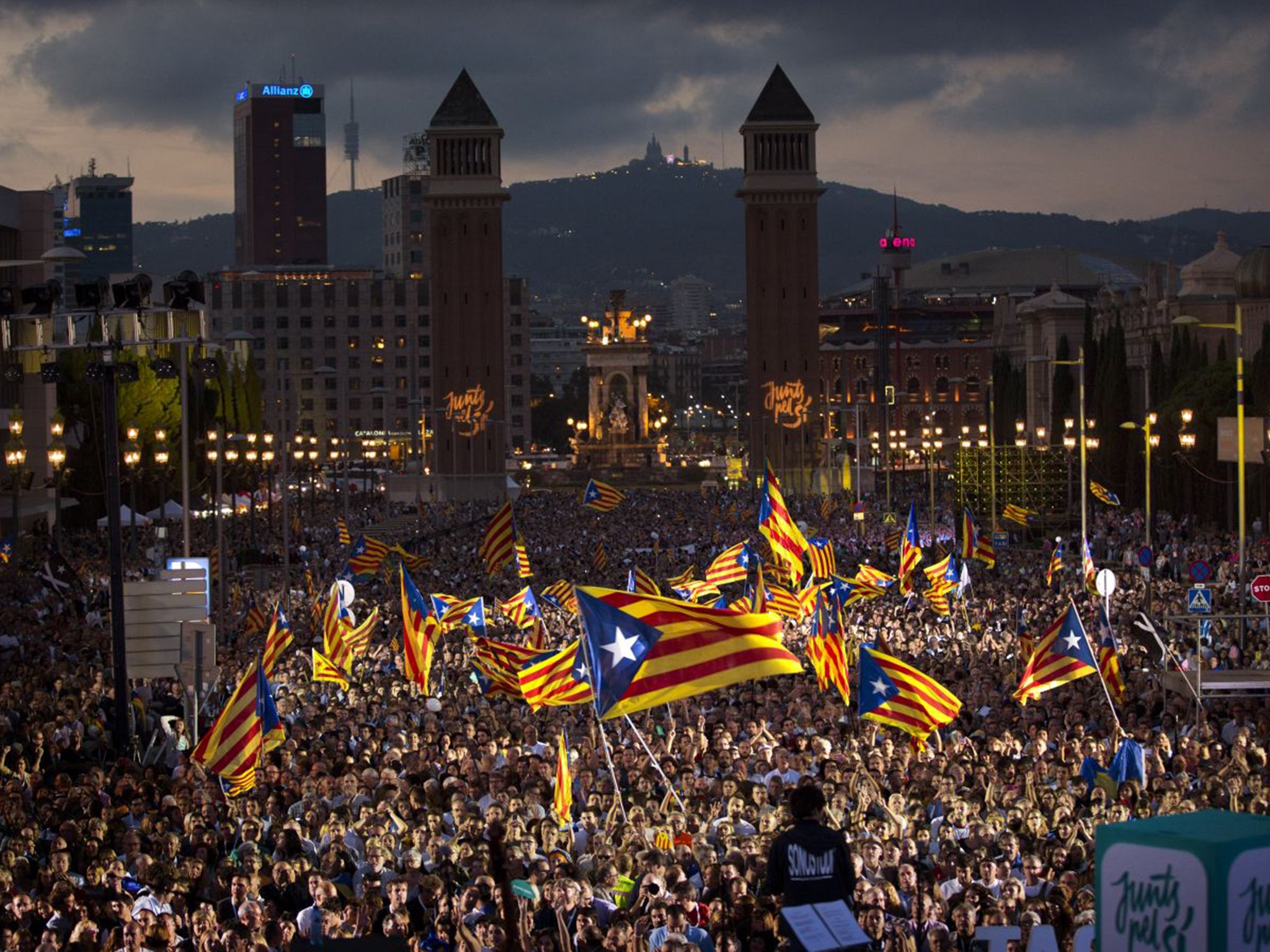Catalan independence vote: Spain could split up as a result of 'quasi-referendum'
'We’re fed up with Spain getting the better part of the financial deal ... Catalonia has to break away'

Easing his mop back into its bucket, Albert Coll took a break from cleaning the pavement outside his ironmonger’s store to discuss the regional elections in Catalonia on 27 September. His views were clear: in a vote that many have seen as a quasi-referendum for their independence drive, it was time to back the parties that wanted a split from Spain.
“Economically, it makes sense. Our transport infrastructure is far worse than it should be, and the way the Madrid-based media are so prejudiced against us – you get a bit fed up with that,” Mr Coll said . “If the pro-independence parties get voted in, then who knows what could happen next.”
In Girona, it is easy to find more people who agree with Mr Coll; it is the largest of the Catalan cities where the main pro-independence parties, CDC, CUP and ERC, took the most votes in previous polls.
“We’re fed up with Spain getting the better part of the financial deal ... Catalonia has to break away,” said one Girona-born pensioner (who did not want to give her name) sitting on a bench with her husband just a stone’s throw from Mr Coll’s shop. Her elderly spouse concurred, saying with a grin ,“Anything she says, that’s right.”
One of the few points on which everybody in Spain agrees is that the elections will have a major, countrywide impact on politics. “One of the most important [polls] in Spain’s modern-day democracy,” a leading Spanish daily, El Mundo, said in an editorial. “The most exceptional since democracy was reinstated,” said Catalonia’s best-selling paper, La Vanguardia.
Unsurprisingly, then, at the final campaign rallies across Catalonia, all Spain’s political leaders were present, with Prime Minister Mariano Rajoy insisting that independence “would not happen”, but warning that stronger pro-separatism would cause “tension and uncertainty”. The leader of the governing Partido Popular (PP) took the unusual step of speaking in Catalan in a recent video, saying simply: “Perque units guanyem” – “Because unity wins”.
The elections have generated an exceptional level of foreign interest. Angela Merkel has spoken in favour of the “territorial integrity” of all European states; David Cameron has warned that any independent state would have to leave the EU; and Nicolas Sarkozy was guest of honour at the PP rally. Sparks have flown at the slightest provocation – on 24 September, pro- and anti-separatist politicians jostled one another to hang their Catalan and Spanish flags from Barcelona City Hall balcony.
Pro-independence officials say the first step, in the case of victory, would be to draw up an 18-month road plan for Catalonia’s independence, something Mr Rajoy and his allies say he will block.
“These elections mark the point where we can really vote for our own state,” said Anna Caula, a sports coach and candidate for Junts pel Si, the pro-independence coalition, in Girona. “It’s what the people want.” She added: “In a recession like we’ve had, with a lot of economic suffering, when the state doesn’t listen – there comes a point where people rebel.”
Separatists have had to face a steady onslaught of dire warnings over the economic consequences of independence – but cultural, linguistic and social differences play their part in their drive for a Catalan state, too.
Turnout on 27 September is expected to be much higher than usual; around 75 per cent of the 5.5 million eligible to vote, with most advance polls showing pro-independence parties taking a narrow but decisive majority in Catalonia’s 135-seat parliament. But although polls suggest vast swathes of inland Catalonia want independence, and Barcelona is split down the middle, the key to victory may well lie in the Catalan capital’s huge industrial hinterland, traditionally less prone to vote in regional elections and with higher support for pro-Spanish parties. An estimated one in five voters is undecided. And beyond the vote, there is the complication of Spain’s general elections in December.
In Girona, only one outcome is likely this weekend – a separatist victory. “Here the political scene has always been much more pro-separatist, but it’s become far more radical,” said journalist Lluis Simon. It is certainly more high profile: in 2010, when Merce Escara hung a Catalan flag from her Girona flat window, she was asked to remove it by her apartment administrator. Now, in Girona’s old quarter, Catalan esteladas all but swathe entire buildings, and some kiosks have no newspapers in Spanish. As for at least one of the few city-centre posters for the PP’s Catalan leader, Xavier Garcia Albiol, it has been daubed with paint.
Join our commenting forum
Join thought-provoking conversations, follow other Independent readers and see their replies
Comments